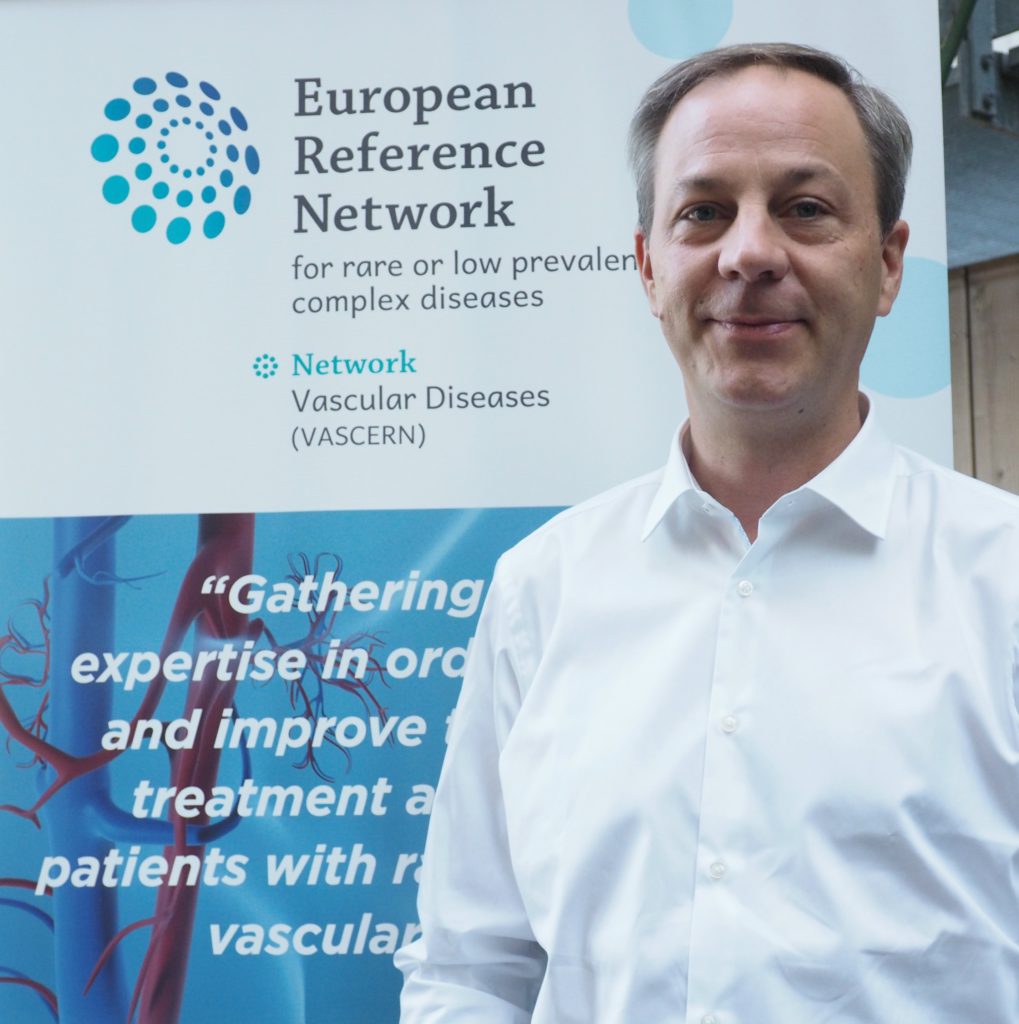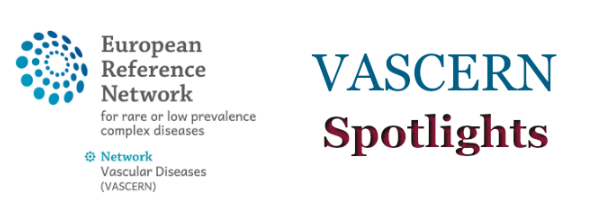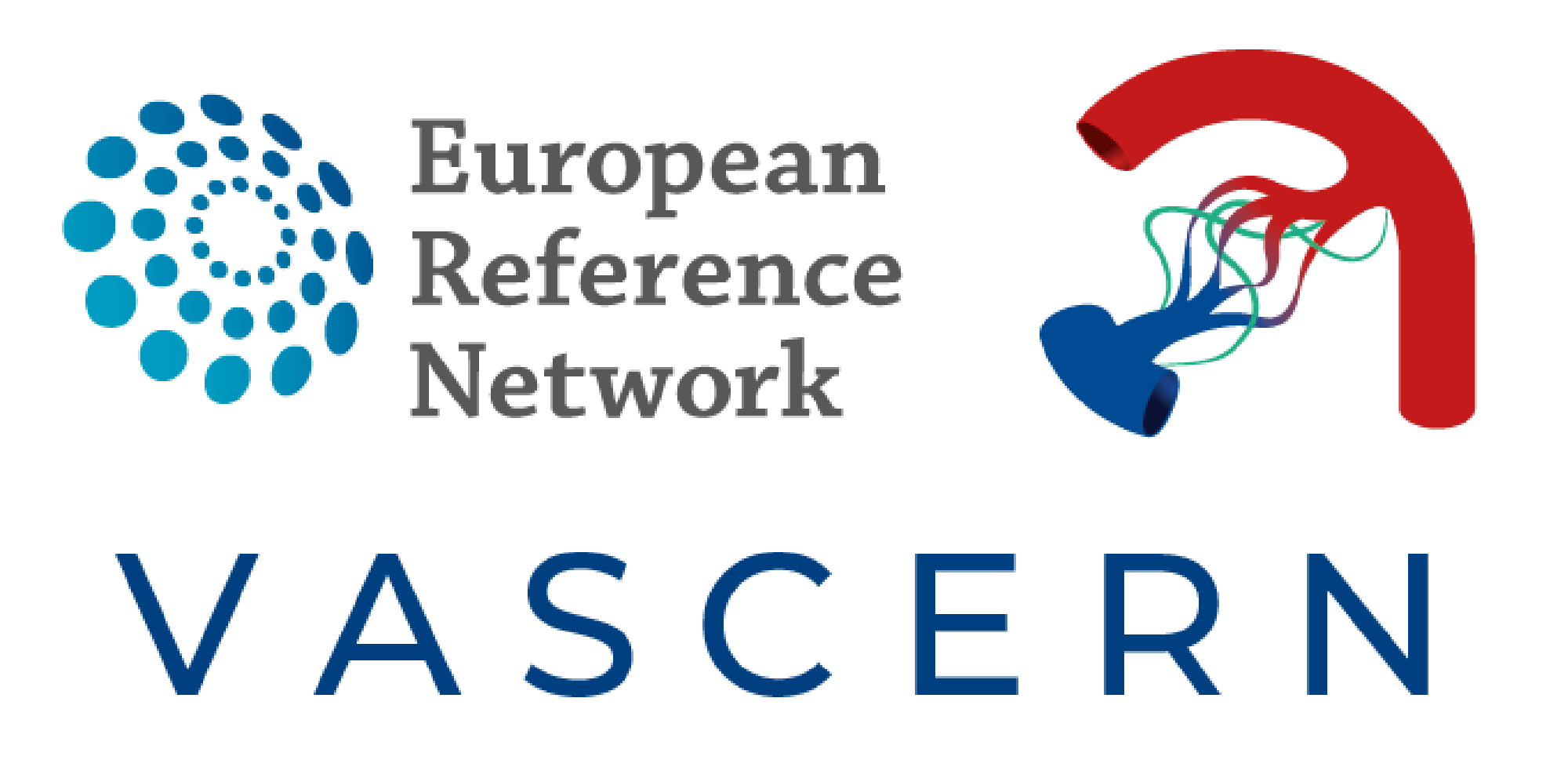

During VASCERN Days 2019, we were lucky enough to catch up with Dr. Michael Frank, Co-Chair of the Medium-Sized Arteries Working Group (MSA WG), from Paris, France for a VASCERN Spotlights interview. Dr. Frank tells us how he became involved with VASCERN, the clinical research on vascular Ehlers-Danlos syndrome (vEDS) that he is currently involved in and his greatest hopes for rare vascular disease patients.
1. What disease(s) do you specialize in (or what is your medical specialty) and what interested you in this field?
I am a Cardiologist with a complementary specialization in vascular Medicine. This is how I became involved with rare vascular diseases, and more particularly with vascular Ehlers-Danlos syndrome (vEDS), starting from the year 2002 while working in a dedicated vascular medicine department in a university hospital in Paris, France. This coincided with the launch of the French National Networks for Rare Diseases and the creation of the French National Reference Centre for vEDS at Hôpital Européen Georges Pompidou in Paris, France. From there on, I have been very involved in the genetic diagnosis and the management of clinically silent and acute organ complications in vEDS patients using a multidisciplinary approach.
2. How did you become involved in VASCERN?
I heard of VASCERN through the French national network for rare vascular diseases (FAVA-Multi) and our center was naturally also involved on the international level in the diagnosis and overall patient management of this rare condition in which we had over a decade of experience.
My greatest hope is to expand access to diagnosis and optimized treatment to all patients with vEDS in Europe, and especially to patients in those countries without an existing referral network.
3. What is your greatest hope for VASCERN?
My greatest hope is to expand access to diagnosis and optimized treatment to all patients with vEDS in Europe, and especially to patients in those countries without an existing referral network. This is also a great opportunity to raise awareness for this rare condition with policy makers and healthcare providers, and may trigger necessary adjustments in order to deliver adapted treatment to patients.
4. What challenges do you face as a healthcare professional in the rare disease field?
The structured care network and the progress in medical therapy have allowed us to achieve a significant reduction in vEDS patient arterial morbidity and mortality. There are however numerous remaining challenges: further improvement of patient outcomes are necessary, bowel fragility needs to be better characterized in order to reduce associated morbidity, and decision making regarding pregnancy and associated complications require continued attention and research efforts.
5. What have you accomplished in your medical career that you are most proud of?
I actively participated in the construction of the French national referral Centre for vEDS created in 2006, a dedicated medical structure for patient diagnosis and that provides high level expert care when necessary, clinical research and clinical trials, but also continuous support for patients and for healthcare professionals. Our center associates geneticists, cardiologists, specialists in vascular medicine and psychologists and works in close collaboration with associated specialists. I also designed a dedicated database for the patients of our center that encompasses medical history and molecular diagnosis and that effectively allows for assessment of patients and their respective complications when they occur. This database has expanded over a period of 19 years and now contains data from close to 200 patients with molecularly proven vEDS. These data have permitted important progress in the understanding of the disease to be made and have led to more effective patient management. The RaDiCo vEDS platform, a national vEDS registry in France, intended to be expanded to the European level (part of VASCERN’s registry project), has been adapted from this database.
6. Are you currently involved in any research projects or clinical trials? If so can you please describe them briefly?
I am actively involved in clinical research on vEDS with several publications on the natural history of vEDS (including arterial outcomes, digestive and respiratory complications). I am the primary investigator of a study on biomarkers for vEDS and an investigator in the ARCADE trial, a randomized, controlled, double-blind clinical trial studying the effect of irbesartan (a medication used to treat hypertension) on arterial outcomes in vEDS patients.
In my view, the main achievement of VASCERN is to have created a dynamic network of active experts in the field of rare vascular diseases.
7. What VASCERN activities do you participate in and which are your favorite?
I am the co-chair of the MSA working group, which is a great opportunity to meet European experts, to learn about standards of care and networks in neighboring countries, and to think of and work on common standards for patient management.
8. What are the main achievements of VASCERN to date?
In my view, the main achievement of VASCERN is to have created a dynamic network of active experts in the field of rare vascular diseases. The resulting work (e.g. Pills of Knowledge, patient pathways, Do’s and Don’ts factsheets) has drawn international attention and has played a role in creating positive emulation in many aspects of our work in relation to vEDS on the European level and worldwide.


